Economy
“Green” industries and Albo’s Venn diagram
The PM has announced a series of big-dollar programs to promote energy transition, “green” industries, local manufacturing and “critical” minerals. He is juggling themes that are not always consistent. The government needs to be prudent as it backs projects with taxpayers’ money. Mr Albanese seems to be walking about with a Venn diagram in his Continue reading »
Capitalism is the single greatest source of violence
What the present moment reveals, once again, is that Western aggression during the “Cold War” was never about destroying socialism, as such. It was about destroying movements and governments in the periphery that sought economic sovereignty. Why? Because economic sovereignty in the periphery threatens capital accumulation in the core. This remains the primary objective of Continue reading »
Adopting the Aquaculture of the Future in Thailand
Somporn Kaikaew is the owner of Prapapan Farm in Nakhon Pathom, a city 40 miles west of Bangkok. He farms tilapia fish and white shrimp across 160,000 square meters of land.
We hitch a ride on the back of Somporn’s pickup truck, driving along the dusty roads that separate the fish farm’s large ponds of water. His farm is tightly operated, with the ponds segregated neatly, along with bird traps and scarecrows to deter predators and sophisticated recirculation systems to keep the water clean.
There are thousands of monoculture fish farms in Thailand, but Somporn, 60, has been practicing polyculture fish farming for the best part of three decades. When asked whether it was a more complicated operation farming multiple species, he said it’s all he’s ever known.
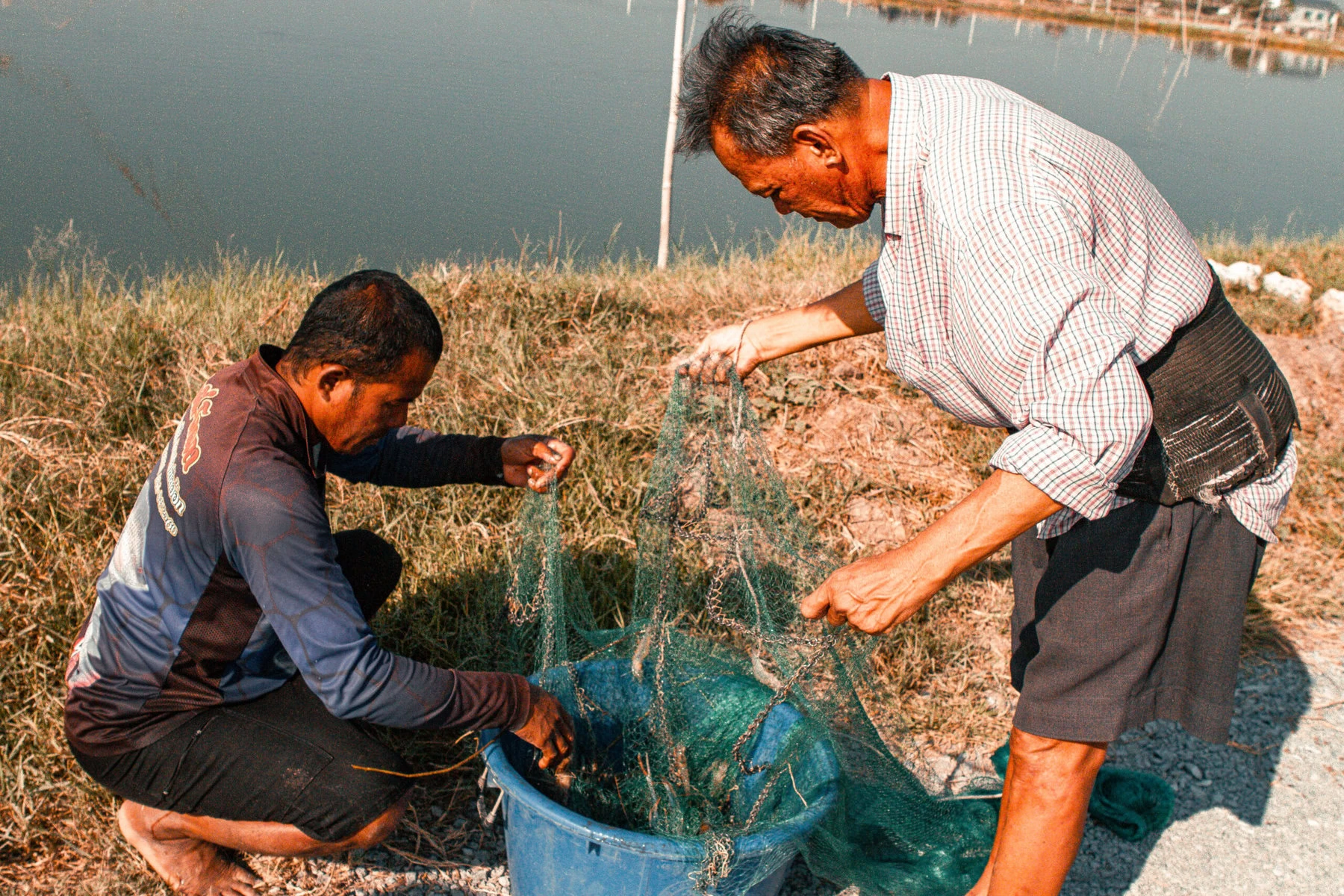 Somporn Kaikaew (right) has been practicing polyculture on his fish farm for 30 years. Credit: Tommy Walker
Somporn Kaikaew (right) has been practicing polyculture on his fish farm for 30 years. Credit: Tommy Walker
“I’ve had this farm for 30 years and I’ve always mixed from the beginning. I copied from another farmer, it looked like it worked so that’s why I did it,” he said.
In Thailand, farming fish and shrimp together is one of the most common practices in polyculture farming. It’s also the first step toward bigger changes in sustainability that Thailand’s aquaculture and fishing industry could see in the coming years.
That’s the hope of aquaculture experts as they prepare to convince more of Thailand’s fishing farmers to shift to a more sustainable model in which marine species are grown within the same system. That system, which is already being successfully practiced on a few fish farms in Thailand as well as in many other places worldwide, is called Integrated Multi-Trophic Aquaculture (IMTA). In IMTA, multiple organisms from different trophic levels — rungs on the food chain, essentially — are farmed together in such a way that they complement one another, thereby reducing waste and improving growth efficiency. This combination of sustainability and efficiency is better for the environment than monoculture — and more profitable, too.
At Prapapan Farm, we stop at one pond as one of Somporn’s farmers casts a mesh fish net and captures a couple of tilapia fish. A few meters away, another pond is filled with white shrimp.
“We feed both mixed and separate fish and shrimp. The benefit is we can sell both, but shrimp is the trend of the market [at the moment],” Somporn says.
Credit: Tommy Walker
Farming fish and shrimp together, as Somporn does, is a common practice in Thailand. And it’s the first step toward a more complex, sustainable system.
As Somporn explains, the fish’s feces help to make the water balanced and are consumed by the shrimp. The processing, he says, isn’t complicated; he’s able to sell the shrimp in just two months and the fish in five to six.
“In the past the old generation fed the fish and shrimp separately, but it’s not good money and slower for profit,” Somporn says. “But more of the new generation are mixing them together, which is good profit and good results and that’s why we do it this way.”
Thailand’s fishing industry plays a big role in the country, both economically and socially. The thousands of miles of coastline that span 24 provinces in the Gulf of Thailand and the Andaman Sea provide a rich source for local fishermen to catch millions of metric tons of fish and marine life each year. This crucially contributes to jobs, income and livelihoods for hundreds of thousands of people. The accessibility of seafood also means fish is a cheaper option and protein source for many Thais compared to chicken, pork and beef, especially for those living in coastal areas.
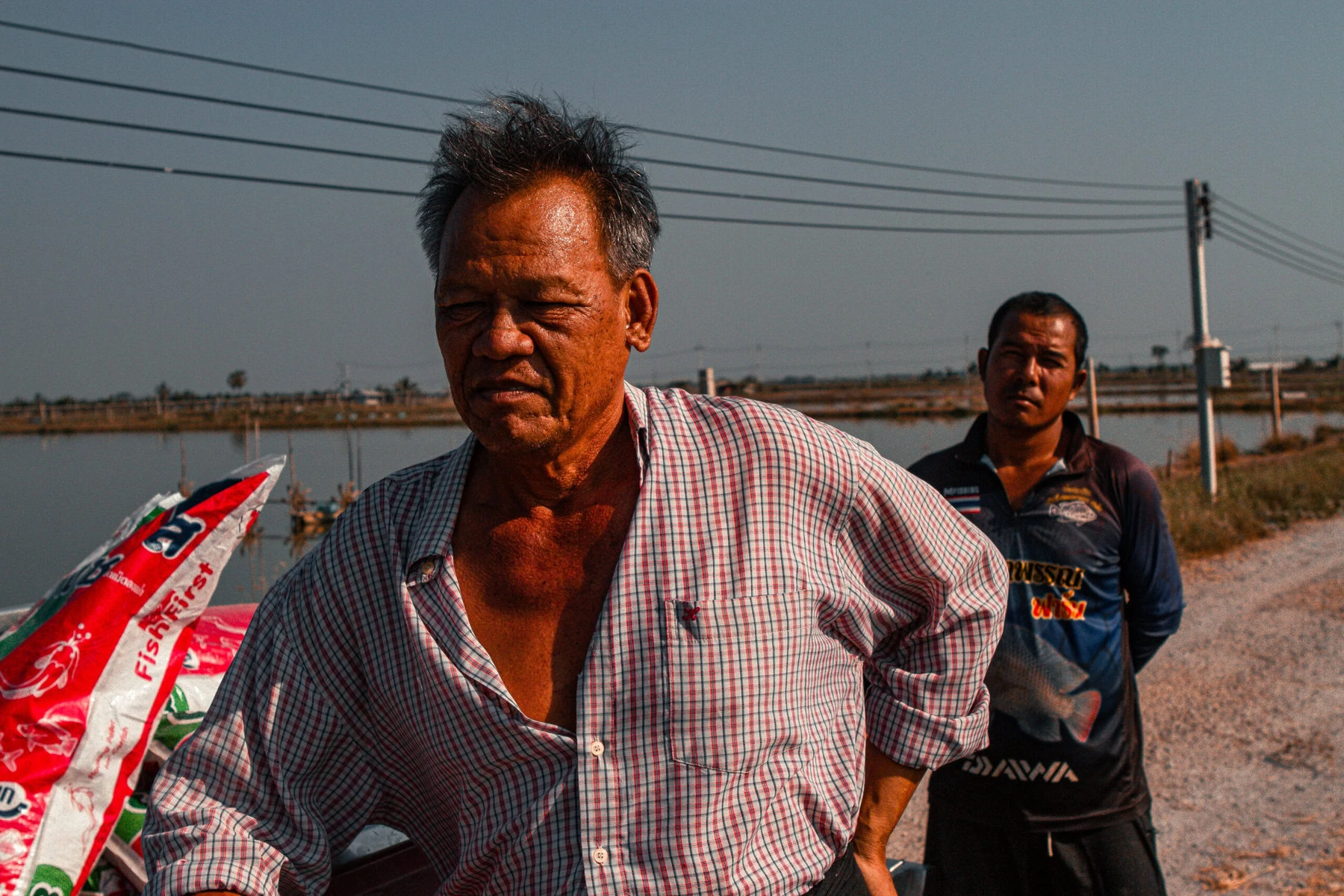 “In the past the old generation fed the fish and shrimp separately, but it’s not good money and slower for profit,” Somporn Kaikaew says. Credit: Tommy Walker
“In the past the old generation fed the fish and shrimp separately, but it’s not good money and slower for profit,” Somporn Kaikaew says. Credit: Tommy Walker
Thailand’s economy is also heavily dependent on exports, accounting for over half of the country’s GDP. The country’s shrimp exports produce billions of dollars for the local economy, despite the industry being affected by disease in the last decade. Overall, Thailand’s agriculture, forestry and fishing industry contributes to over eight percent of the country’s GDP. Around 1.5 percent of that comes from the fisheries industry as of 2021, data shows.
But some aquaculture experts hope more Thai fish farmers will fully incorporate the IMTA model within their farms in the future to increase revenue.
Crushed by negative news?
Sign up for the Reasons to be Cheerful newsletter.
[contact-form-7]
Of course, the reasons to practice IMTA go beyond the financial. Dr. Pitchaya Chainark, an expert in coastal aquaculture at Kasetsart University, sees IMTA as a way to increase both Thailand’s fishing industry’s GDP and farmers’ income as well as create a balance of conservation and sustainable use of aquaculture resources.
“In Thailand there are not many [practicing] right now, as many prefer to do polyculture. IMTA is different, it is like a food chain. The species should have symbiosis and help each other,” she says.
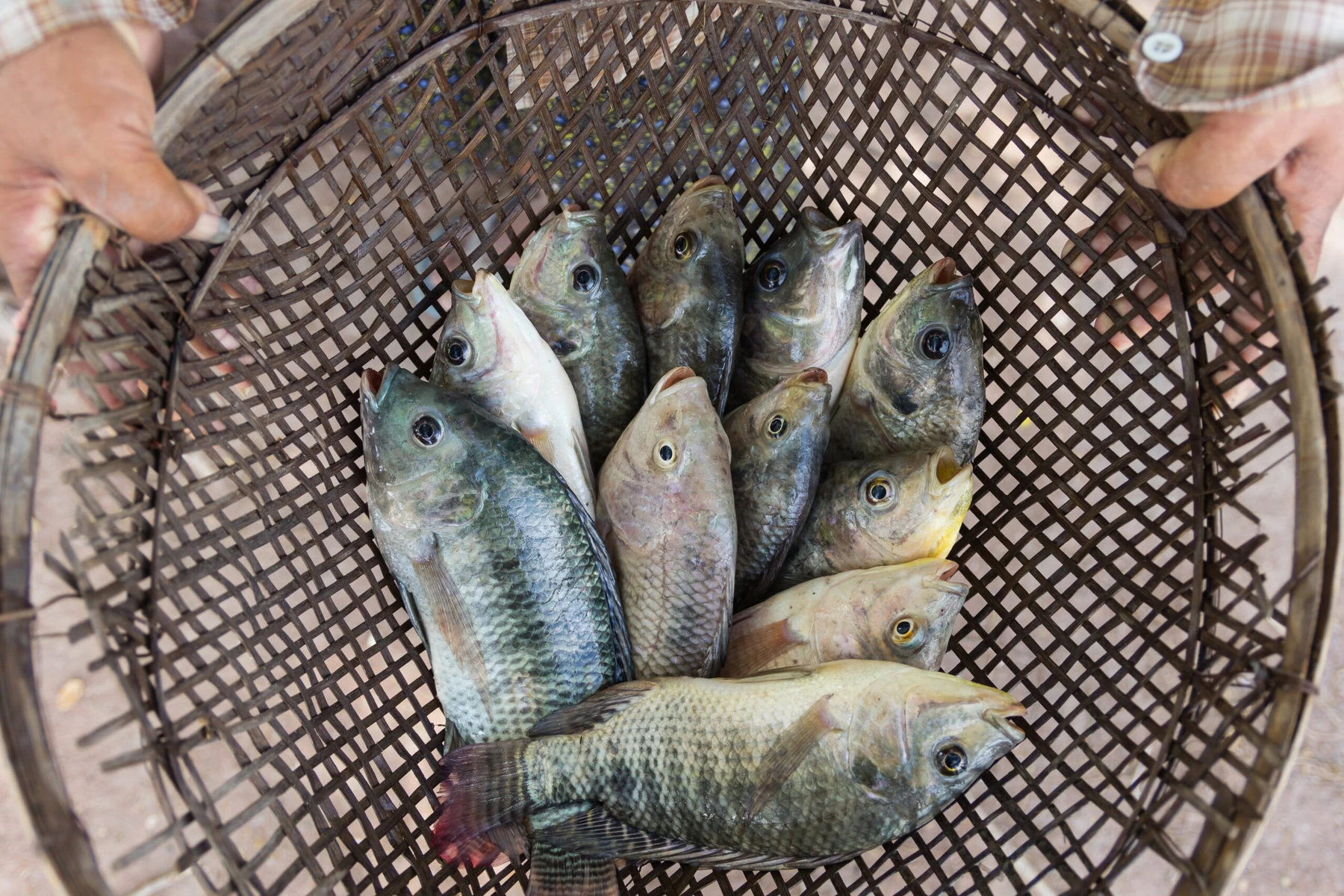 Thailand produces more tilapia than any other freshwater fish. Credit: Anupan Praneetpholkrang / Shutterstock
Thailand produces more tilapia than any other freshwater fish. Credit: Anupan Praneetpholkrang / Shutterstock
In an ideal IMTA system, a higher trophic species, such as a fish, would be paired with suitable middle trophic species, and then lower trophic species such as plants and invertebrates. The cycle would see the plants consume waste, such as fish feces, sediments and uneaten feed to boost their own growth. The trophic species would be grown in conjunction with each other, providing the farmer with more seafood to sell.
In China, IMTA has already provided an environmentally sustainable and profitable solution for nearly two decades. Professor Jianguang Fang of the Yellow Sea Fisheries Institute in Shandong says IMTA was implemented starting in 2000, mainly to combat “self-pollution” that had come from too many intensively fed aquaculture systems in Sungo Bay, Shandong province. According to Fang, the pollution caused high levels of sediment and nitrogen in water, which can cause an excess of nutrients that can decrease the amount of oxygen in the water. Now, fish farms on Sungo Bay have implemented IMTA systems with high and low trophic species, including fish, seaweed, shellfish and abalones. Because there’s a market in China for all of the farmed species, farming this way is boosting profits.
One aquaculture multi-species system at Sungo Bay also included kelp, oysters and seaweed. The farm became more sustainable and profitable when the density of seaweed was reduced — which sped up growth — which eventually led to the farmers’ income growing by a huge 97 percent.
Credit: Tommy Walker
Though only a few fish farms in Thailand are currently practicing IMTA, aquaculture experts — seeing the success IMTA has had in China and elsewhere — hope the practice will catch on more broadly.
In Thailand, Dr. Pitchaya is now waiting on the government’s decision to approve a proposal to work to increase the practice of IMTA. Government grants would assist farmers in the transition. The hope is that once more Thai fish farmers find success using IMTA, other farmers, seeing the financial benefits, will follow suit.“[We are] already speaking with the farmers,” Dr. Pitchaya says. “In Phuket we have two farms that are practicing, and we are trying to promote them to other provinces.” She wants to help smaller farmers by getting them to consider both the financial and environmental benefits. “If my proposal is accepted, I think next year more than 50 farms will be practicing IMTA,” she says.
The first instance of IMTA in Thailand was a cage aquaculture system in the coastal areas of Phuket. And it’s already had an environmental, societal and economic impact. Effluent waste has been reduced through the use of biofilters, and there are decreasing environmental costs. According to Dr. Pitchaya, IMTA has boosted the economy as well as employment at local levels. Thailand now hopes to expand and create earthen pond aquacultures in the east of the country.
But some farmers are still reluctant to change.
Phaisal Phanchatree is the owner of Phaisarnpanpa Farm, a monoculture fish farm in rural Bangkok. He operates his farm out of a garden space in front of his house. Like Somporn, he has also been in the fish farm industry for three decades.
“We have had this business for 30 years. It’s a family business, but I’m the main worker,” he says.
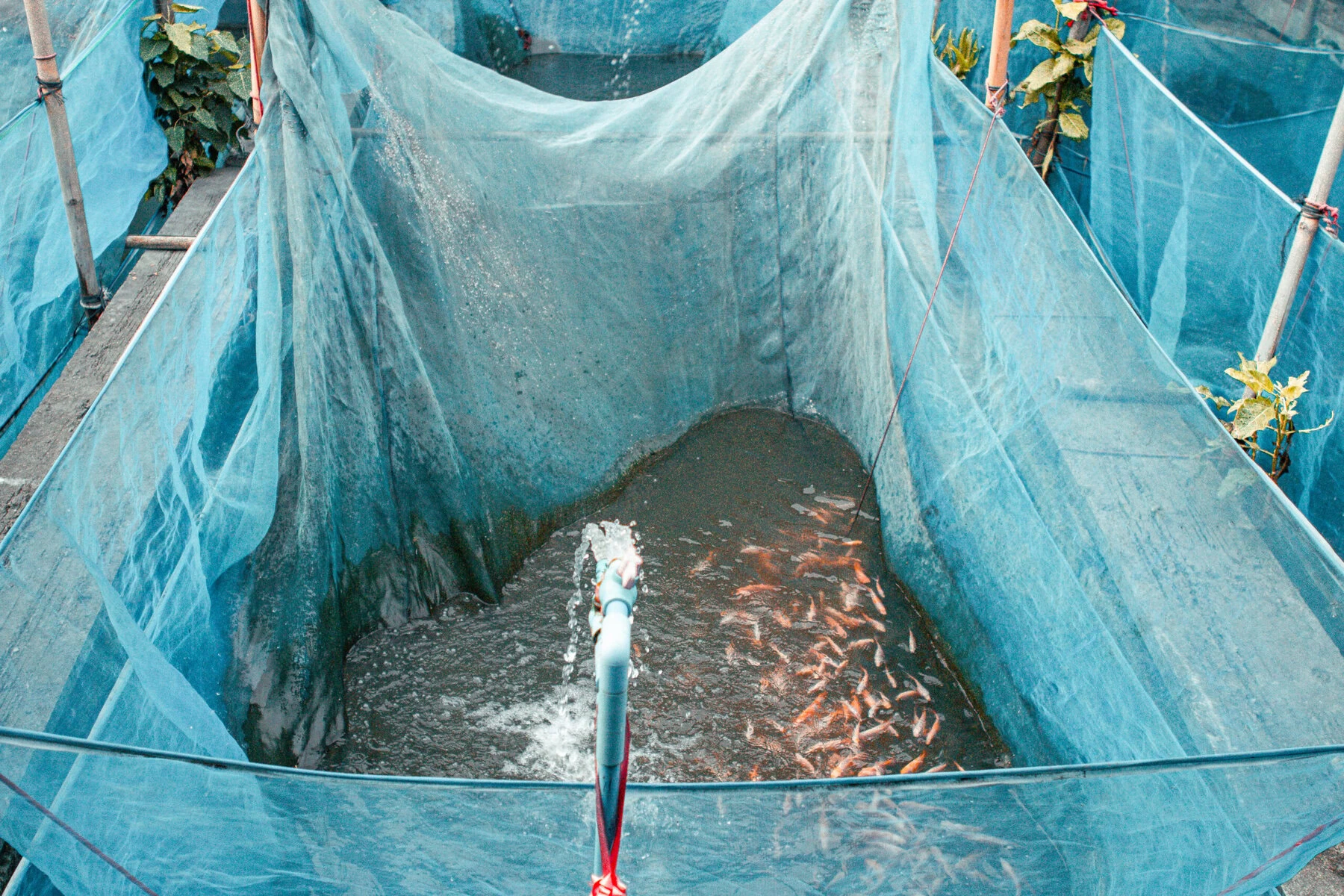 Phaisal Phanchatree runs a monoculture fish farm out of a garden space in front of his home in rural Bangkok.
Phaisal Phanchatree runs a monoculture fish farm out of a garden space in front of his home in rural Bangkok.
Nearly a dozen small ponds, filled with different species of fish including tilapia, lie next to his driveway. A wooden structure covered with blue polyethylene liner separates each habitat, large enough for Phanchatree to maneuver between the ponds.
He believes focusing on one species is the “sincere” way. “It is not cheating the customer,” he explains. “We can sell the fish with the knowledge they were grown this way. It’s not only a selling focus, if we teach the customers how it works, and they are successful, they are going to return to buy fish from us. It’s sustainable.”
Although he insists he will always keep farming fish, he admits there is more money in farming several species, and acknowledges that shrimp is more profitable.
Credit: Tommy Walker
Some longtime fish farmers, like Phaisal Phanchatree, are committed to focusing on just one species and not interested in converting to IMTA.
“Some farmers have a low budget and add the shrimp to feed together, and the result is very good,” he notes. “The main reason is to save on expenses, to save money on the feed. We only focus on fish. If we include shrimp, we have more work, more equipment to buy.”
“I’m not interested in mixing species in the future,” he adds.


Become a sustaining member today!
Join the Reasons to be Cheerful community by supporting our nonprofit publication and giving what you can.
Sukkritt Nimitkul, a lecturer at the department of aquaculture in the faculty of fisheries at Kasetsart University in Bangkok, says with prices and competition increasing, farming one aqua species may not be enough in the future for many farmers.
“It’s a tough sell for the farmers. I think they have run out of margin,” he says. “When you have a lot of margins, you can afford to be reckless but now you don’t have that anymore because the labor prices are going up.”
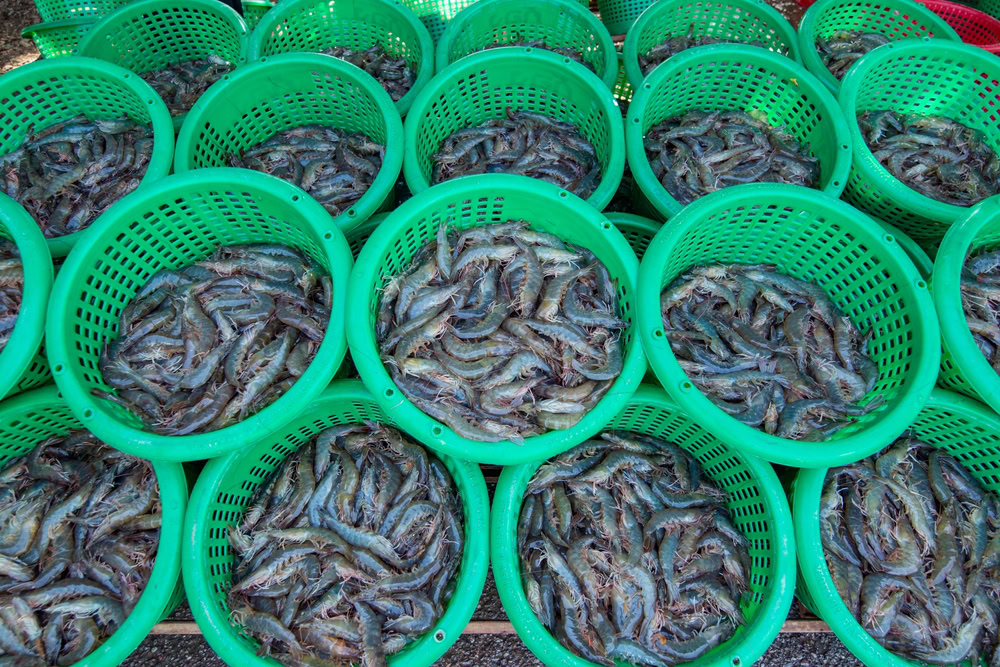 “Shrimp is the trend of the market,” says Somporn Kaikaew. Credit: Amnat30 / Shutterstock
“Shrimp is the trend of the market,” says Somporn Kaikaew. Credit: Amnat30 / Shutterstock
“The older generations have their old ways and don’t want to change. When you do polyculture, you must make sure that the last three months of the species’ lifespans come together. That requires a lot of rotations, planning, categorizing and moving around. So that is quite complicated and time consuming for some farmers.”
But Sukkrit believes change is inevitable.
“Farms will be forced to change in the future, in my opinion, because now the gap [in] the margin is closing,” he says. “Adapt or die will be my word. You must adapt, or the businesses will go out of business.”
The post Adopting the Aquaculture of the Future in Thailand appeared first on Reasons to be Cheerful.
Why conventional economic theory is wrong about technological change
Society as a whole has a critical interest in the direction of technological innovation. This cannot be left uniquely to a limited group of capitalist bosses. Consultation with all the key interest groups and government regulation have a critical role to play in ensuring future economic growth and a fair go for all. This article Continue reading »
As we approach the Federal budget, whatever happened to ‘Measuring What Matters’?
With the federal budget just over three weeks away, researcher Chelsea Hunnisett has some pointed questions for the Albanese Government, including: what happened to plans for a wellbeing economy, and where is your commitment to intergenerational investment for health and wellbeing? Hunnisett is a Laureate PhD Candidate and Government Relations Specialist in the Planetary Health Continue reading »
What does China’s electric vehicle rise mean for the global market?
Chinese smartphone maker Xiaomi recently unveiled its first electric vehicle (EV), the SU7, igniting a spark of excitement. At the launch event, Xiaomi’s founder and CEO Lei Jun, whose vision includes creating “a dream car on a par with Porsche and Tesla,” said that from design to batteries, intelligent driving to cockpit controls, the SU7 Continue reading »
NDIS and Aged Care; from rights first to budget first
When she introduced the first NDIS legislation to the House of Representatives in 2012 Prime Minister Julia Gillard said it was to replace “A system that metes out support rationed by arbitrary budget allocations, not real human needs”. It was a radical break with other forms of welfare assistance because it put the human rights Continue reading »
Sharing the benefits of technological progress
This is the first of three articles discussing how the benefits of technological progress are shared, and thus determine the distribution of income and influence our economic and social structures. This first article focuses on how these benefits have been shared historically. Throughout history the growth in living standards has come from increasing productivity and Continue reading »
The notion of China as “uninvestable” is simply wrong
Despite challenges, including the lingering impacts of the COVID-19 pandemic and structural concerns, voices from within the business community underscore a robust economic outlook. Having lived in Beijing, China’s capital, for more than 10 years, it does not surprise me to see people hurry to work with cups of Starbucks coffee. The coffee-drinking culture has Continue reading »
XR blocking arteries of capitalism labelled “catastrophic inconvenience”
One month ago, three Extinction Rebellion protesters led by Deana ‘Violet’ Coco blocked the Westgate Bridge to deliver a desperate plea to all Australians. ‘Climate Breakdown has Begun.’ ‘Declare a Climate Emergency!’ they urged. Despite 1.15 degrees of warming confirmed in 2022 and the drastic effects of climate change currently affecting global communities, the Federal Continue reading »